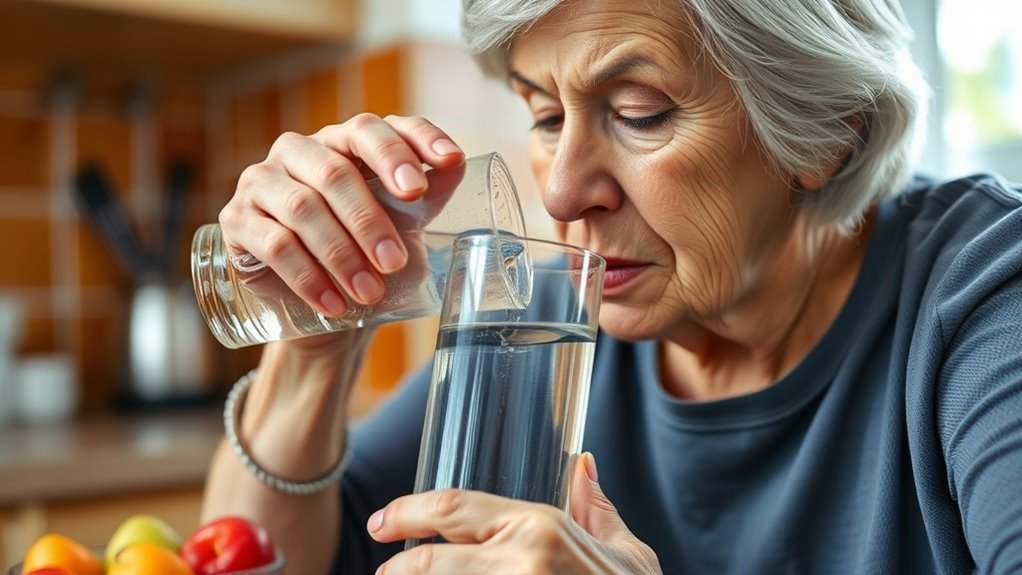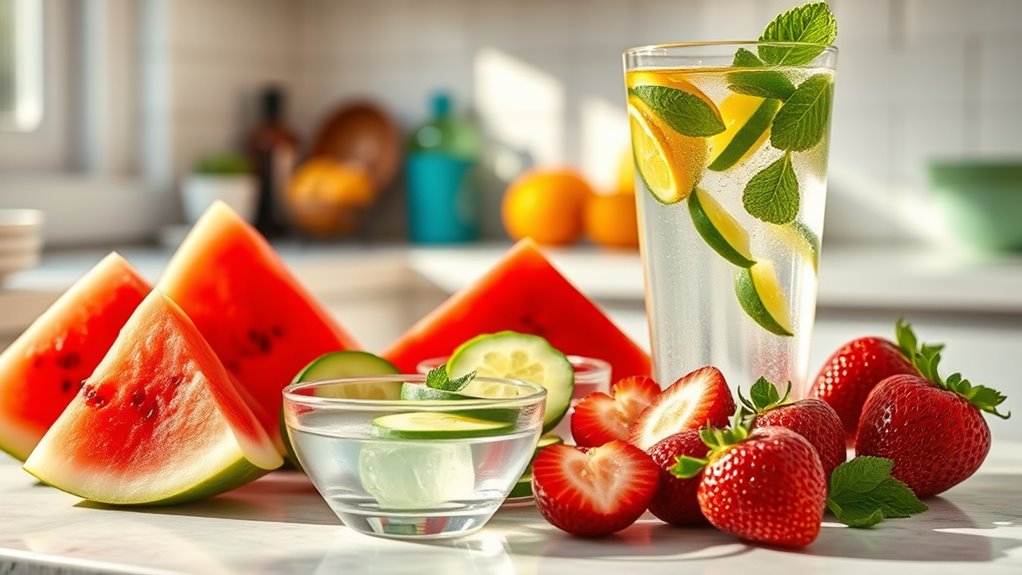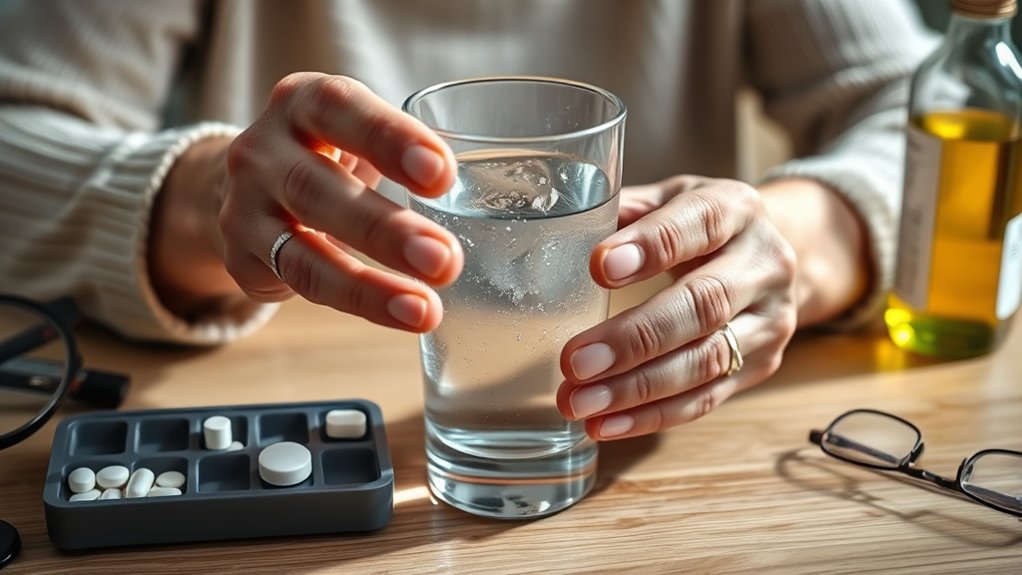To stay well-hydrated, set daily water goals based on your needs and monitor your intake with logs or apps. Include hydrating foods like fruits and vegetables, and make drinking more enjoyable by adding flavors or using fun cups and straws. Establish routines by drinking at specific times, and get support from family or caregivers. If you keep these strategies in mind, you’ll discover more tips to help you stay hydrated and healthy.
Key Takeaways
- Encourage regular fluid intake by establishing specific routines and tracking daily consumption to prevent dehydration.
- Promote consumption of hydrating foods like fruits and vegetables to support overall hydration.
- Recognize signs of dehydration early, such as dark urine and dizziness, for timely intervention.
- Use flavored beverages and appealing presentation to make drinking fluids enjoyable and increase intake.
- Involve caregivers in education and reminders to maintain consistent hydration habits for older adults.
Understanding the Importance of Hydration in Aging

As you age, staying properly hydrated becomes increasingly essential for maintaining overall health. Proper hydration supports fluid absorption, ensuring your cells function effectively. When you’re well-hydrated, your body efficiently transports nutrients and removes waste, which is critical as natural thirst cues diminish with age. Maintaining electrolyte balance is also essential because electrolytes regulate nerve function, muscle contractions, and hydration levels. When electrolyte levels are off, you may experience fatigue or muscle weakness. Older adults are more prone to dehydration, making it important to prioritize hydration habits. Drinking enough fluids helps sustain these indispensable processes, preventing health complications. Recognizing hydration’s role in supporting your body’s internal functions can motivate you to stay consistent with your fluid intake every day. Additionally, understanding Retirement Planning strategies can help you ensure financial security to support your healthcare needs as you age.
Recognizing Signs of Dehydration in Older Adults

You should watch for signs like a dry mouth or feeling unusually thirsty, which can indicate dehydration. Changes in urine color, such as dark or concentrated urine, are also important clues. Additionally, dizziness or weakness may signal that your body isn’t getting enough fluids. Monitoring hydration strategies for older adults can help prevent serious health issues related to dehydration.
Thirst and Dry Mouth
How can you tell if an older adult is dehydrated? One key sign is persistent dry mouth, which can lead to discomfort and difficulty swallowing. Thirst cues may be less obvious in seniors, making dry mouth remedies essential. Look for symptoms like cracked lips or a sticky tongue. To address this, encourage regular sips of water and oral hydration solutions. Remember, dehydration can be subtle, so monitor closely. Use the table below to understand common signs:
| Symptom | Description | Recommended Action |
|---|---|---|
| Dry mouth | Sticky or parched feeling | Offer fluids frequently |
| Thirst cues | Less noticeable in seniors | Remind to hydrate often |
| Cracked lips | Visible dryness | Use moisturizing balms |
| Sore throat | Irritation from dryness | Provide soothing drinks |
Recognizing these signs helps prevent dehydration and maintain comfort. Additionally, understanding how emotional bonds can impact overall well-being underscores the importance of hydration in supporting mental health and resilience among older adults.
Urine Color Changes
Changes in urine color are a practical way to identify dehydration in older adults. Monitoring urine color helps you recognize hydration indicators early. Typically, light, straw-colored urine indicates good hydration, while darker shades suggest dehydration. Keep an eye on these signs:
- Dark yellow or amber urine
- Concentrated, strong odor
- Cloudy or murky appearance
- Decreased urine output
- Dull or no urine color change over time
These urine color changes can signal your hydration status. Staying attentive allows you to address dehydration before symptoms worsen. Using hydration indicators like urine color helps you maintain proper fluid balance and supports overall health. Regularly checking urine color is a simple, effective tool in managing hydration for older adults. Understanding hydration indicators can further improve your ability to maintain proper hydration.
Dizziness or Weakness
Dizziness and weakness are common signs that your body may be lacking adequate hydration. If you experience these symptoms, it’s important to recognize dehydration early. It can affect your balance, increasing fall risk, especially when performing balance exercises. Dehydration may also interact with medications, making symptoms worse. To stay alert to these signs, monitor your hydration levels closely. Use the table below to understand key symptoms and actions:
| Symptom | Possible Cause | Recommended Action |
|---|---|---|
| Feeling lightheaded | Dehydration or medication effects | Drink water and consult your doctor |
| Weak muscles | Electrolyte imbalance | Rehydrate with electrolyte-rich fluids |
| Dizziness | Low blood volume | Rest and hydrate immediately |
| Fatigue | Inadequate fluid intake | Increase fluid intake gradually |
Additionally, awareness of data privacy challenges is essential when managing health information and utilizing digital health tools.
Setting Daily Water Intake Goals
To set effective daily water intake goals, you need to understand your personal hydration needs, which can vary based on age, activity level, and health conditions. Tracking your daily consumption helps you stay aware of how much water you’re drinking and identify any gaps. By customizing your goals, you’ll be better equipped to maintain proper hydration every day. Additionally, considering your juice cleansing habits can help you balance hydration with nutrient intake.
Determine Personal Needs
Determining your personal water intake needs is a crucial step in staying properly hydrated as you age. Each person’s hydration assessment varies based on factors like activity level, health status, and environment. To set effective daily goals, consider your unique needs rather than generic recommendations. Incorporating accurate paint coverage calculations can serve as a useful analogy for understanding your hydration needs more precisely. Here are key ideas to guide you:
- Monitor your current fluid intake and identify gaps
- Account for climate and activity level
- Consult your healthcare provider for personalized advice
- Pay attention to signs of dehydration
- Adjust intake based on health conditions or medications
Track Daily Consumption
Once you’ve assessed your personal hydration needs, the next step is to monitor your daily water consumption. Tracking hydration helps you stay aware of how much fluid you’re drinking and ensures you meet your goals. Use a fluid intake log or a mobile app to record every glass of water, juice, or other beverages you consume throughout the day. Consistent tracking reveals patterns, highlights times when you might forget to hydrate, and helps you adjust your intake as needed. Setting daily water intake goals based on your needs makes tracking more purposeful. Remember, small, steady adjustments can improve your hydration habits over time. Staying mindful of your fluid intake empowers you to maintain proper hydration and supports your overall health. Regularly reviewing your hydration patterns can help identify areas for improvement and ensure you stay on track with your hydration goals.
Incorporating Hydrating Foods Into the Diet

Incorporating hydrating foods into your diet is an effective way to boost fluid intake naturally. Fruits for hydration, like watermelon and oranges, are juicy and revitalizing, making them easy to include in your meals or snacks. Hydrating vegetable options such as cucumbers, lettuce, and zucchini are also high in water content and versatile in salads or stir-fries. These foods not only hydrate but also provide essential nutrients. To maximize their benefits, try adding a variety of these foods daily.
Boost your hydration naturally with juicy fruits and crisp vegetables like watermelon, oranges, cucumbers, and lettuce.
- Fruits for hydration: watermelon, oranges, strawberries, cantaloupe, grapes
- Hydrating vegetable options: cucumbers, lettuce, zucchini, celery, radishes
- Incorporate into salads and smoothies
- Snack on fresh fruit slices or veggie sticks
- Use as a side dish or in soups
Tips for Making Drinking Fluids Easier and More Enjoyable

Making drinking fluids more enjoyable can encourage you to stay better hydrated throughout the day. To do this, try flavor enhancement by adding slices of citrus, berries, or herbs like mint to your drinks. These small changes can make plain water more appealing. Incorporating fluid variety is also helpful; alternate between different beverages such as herbal teas, flavored waters, and diluted fruit juices. Using fun cups or straws can make drinking more engaging. Keep beverages at different temperatures—warm, cold, or iced—to suit your preferences. Remember, the key is to find options that excite your palate and make hydration feel less like a chore. Exploring hydration strategies can further support your efforts to stay well-hydrated. By making small adjustments, you’ll find it easier and more enjoyable to drink fluids regularly.
Adjusting Hydration Strategies for Health Conditions and Medications

Adjusting your hydration approach becomes especially important if you have certain health conditions or take medications that affect fluid needs. Chronic health conditions like kidney disease or heart failure can influence how much fluid you should consume, while medication interactions may alter your body’s hydration balance. To stay safe, consider these tips:
- Consult your healthcare provider regularly about your fluid intake
- Monitor for symptoms like swelling or dizziness
- Limit alcohol and caffeine if these worsen your condition
- Adjust fluid intake based on medication side effects
- Keep track of daily fluid consumption to stay within recommended ranges
- Being aware of how your body responds to different conditions and treatments can enhance your hydration strategies and ensure optimal health.
Being mindful of how your health and medications impact hydration helps prevent complications and supports overall well-being. Always seek professional advice tailored to your specific health needs.
Creating a Hydration Routine for Consistency

Are you finding it challenging to remember to drink enough fluids daily? Creating a hydration routine can help build consistency. Start by setting specific times to drink, such as with meals or mid-morning. To make it enjoyable, incorporate flavor enhancement options like adding lemon or herbs, which can encourage you to drink more. Vary your beverage choices to prevent boredom—include water, herbal teas, or diluted fruit juices. Keep a visible water bottle nearby as a reminder. Establishing a routine not only makes hydration habitual but also reduces the chance of forgetting. Over time, these small adjustments will make drinking fluids an effortless part of your daily life, supporting your overall health and well-being.
Encouraging Support From Caregivers and Family Members

Encouraging support from caregivers and family members plays an essential role in helping older adults maintain proper hydration. Your involvement can boost motivation and guarantee consistent fluid intake. Educate yourself and others about the importance of hydration and recognize signs of dehydration. Promote family involvement by creating a supportive environment that encourages regular drinking habits. Consider these strategies:
Support caregivers and family in promoting hydration and recognizing dehydration signs.
- Share information on hydration needs and risks of dehydration
- Set reminders for drinking fluids throughout the day
- Make drinking fluids a social activity
- Keep hydration options accessible and appealing
- Observe and communicate any signs of dehydration promptly
Frequently Asked Questions
How Does Dehydration Affect Cognitive Function in Older Adults?
Dehydration directly impacts your cognitive function, leading to noticeable cognitive decline. When you’re dehydrated, your brain struggles to operate efficiently, causing issues like confusion, memory lapses, and difficulty concentrating. The hydration impact on older adults is significant because even mild dehydration can impair mental clarity. Staying well-hydrated helps maintain peak brain function, reducing the risk of cognitive decline and supporting your overall mental health.
Are There Specific Drinks Better Suited for Older Adults’ Hydration?
Feeling fabulous and refreshed, you should favor flavorful water and electrolyte beverages. These drinks boost hydration by offering essential electrolytes and appealing tastes that motivate you to hydrate regularly. Flavored water provides a tasty twist without added sugars, while electrolyte beverages replenish crucial minerals lost through activity or illness. Choosing these drinks helps maintain your hydration, supporting overall health, energy, and well-being every day.
How Can I Encourage Elderly Relatives to Drink More Fluids?
You can encourage your elderly relatives to drink more fluids by adding flavor enhancements like fresh fruit or herbal teas to make drinks more appealing. Use hydration reminders, such as setting regular alarms or placing water bottles in visible spots, to prompt them to sip throughout the day. Engaging them in choosing their favorite flavors can make hydration more enjoyable and routine, helping them stay properly hydrated with less resistance.
What Are the Risks of Overhydration in Older Adults?
Overhydration in older adults can cause serious issues like electrolyte imbalance and kidney strain. You might think drinking plenty is always good, but too much fluid can dilute essential minerals, disrupting heart and muscle functions. Excess water puts stress on the kidneys, which may already be weakened. To prevent this, encourage balanced fluid intake and monitor symptoms, ensuring they don’t develop into dangerous health problems.
How Does Climate or Season Influence Hydration Needs?
Climate and season directly impact your hydration needs. In hot, humid weather, you should increase your fluid intake and choose seasonal beverages like iced herbal teas or fruit-infused water to stay refreshed. During colder months, opt for warm drinks and remember to adjust your intake based on activity levels and indoor heating. Climate adjustment tips help maintain proper hydration and prevent dehydration, ensuring you stay healthy year-round.
Conclusion
Staying hydrated is essential for your health as you age, and it’s easier than you think. Even if you worry about forgetting or dislike drinking plain water, adding flavorful options or hydrating foods can make it enjoyable. Don’t let concerns about health conditions or medications hold you back—adjust your routine with your healthcare provider’s advice. By making small changes, you’ll boost your well-being and feel more energized every day.









